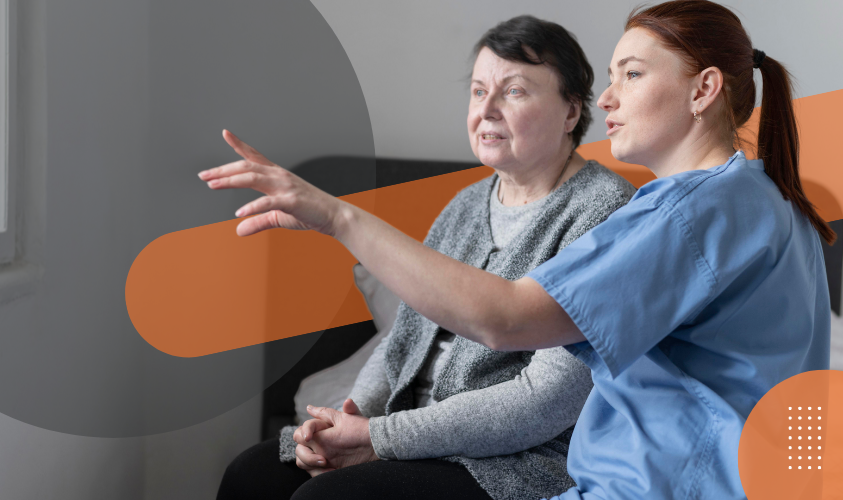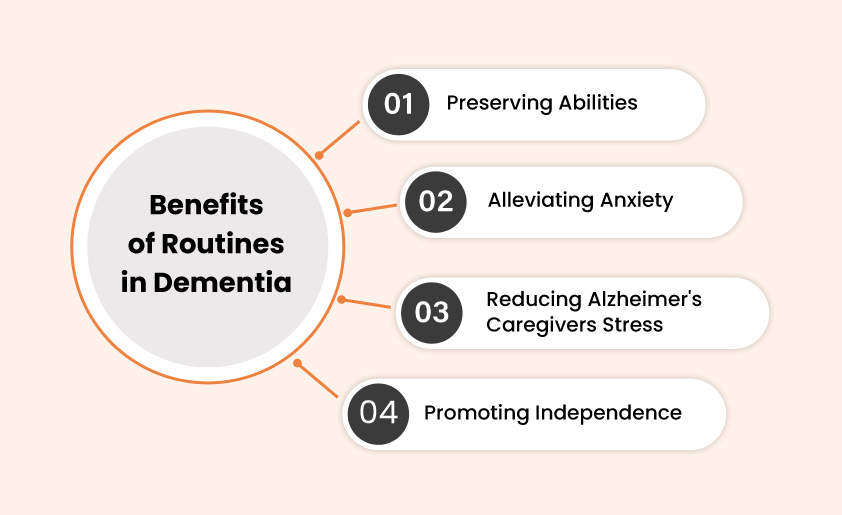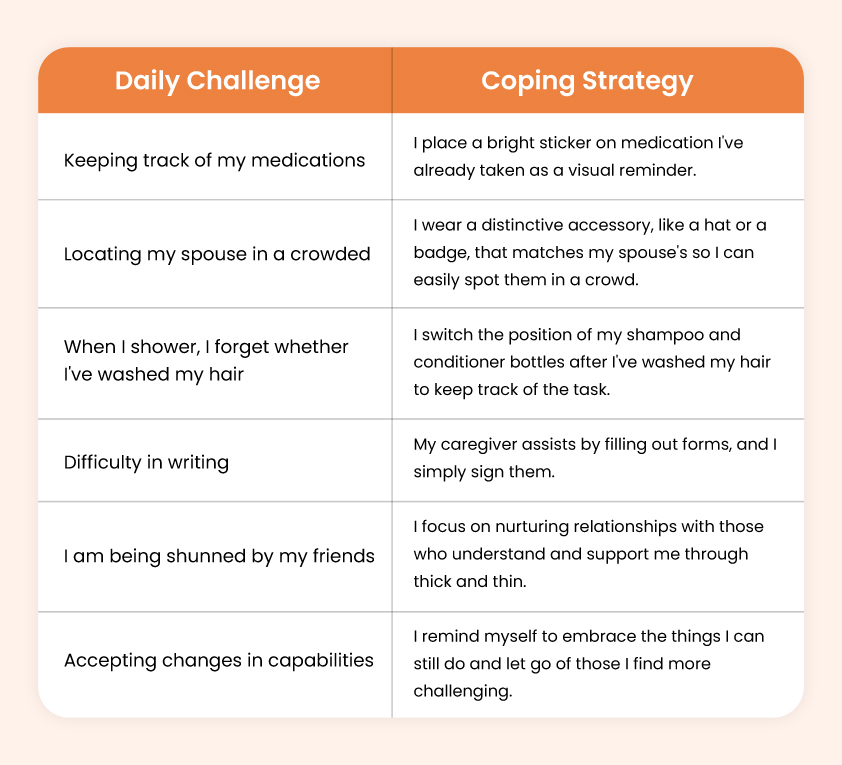
Caregiving for Seniors with dementia is no easy feat.
In fact, according to Dr. Scott McGinnis, medical editor of the Harvard Special Health Report –
“It is stressful, physically and emotionally draining, and very expensive, as almost 15 million unpaid caregivers for people with Alzheimer’s and other dementias can attest.”
Here, having a proper daily routine can help caregivers a lot. Because Alzheimer’s mostly messes with short-term memory first, people can often remember their routines for a long time. In the early phases of dementia, individuals might remain keenly aware of their routines and may vocally protest if any alterations are made. As the condition progresses into the middle stages, routines tend to evolve into more automatic physical actions, like the instinctual motion of brushing one’s teeth.
That’s why in today’s article, we are sharing why a routine is beneficial for senior Alzheimer’s disease and a few best practices to ace the routines.
Various types of daily routines encompass activities that occur regularly, typically daily. For instance, these routines may involve actions like having breakfast, perusing the morning newspaper, attending a weekly hair appointment, drying dishes after lunch, taking evening strolls, or setting the table for dinner.
Additionally, routines can include the sequence in which tasks are carried out. For instance, when preparing for bedtime, one might begin by entering the bathroom, followed by brushing teeth, using the toilet, washing hands, and then retiring to bed.
When crafting a routine for seniors with dementia, it’s essential to incorporate activities that promote physical activity, such as a morning walk, along with therapeutic pursuits like music, art, or puzzles. This holistic approach helps engage the individual’s mind and body, fostering a sense of well-being and fulfillment throughout the day.

Establishing a solid routine offers a framework for the day, ensuring a balance between physical activity, rest, social engagement, and both stimulating and calming activities. Let’s dive into the additional benefits provided by these established routines:
Engaging in regular activities, whether they involve physical tasks or mental exercises, can help seniors maintain their functional abilities as dementia progresses. By consistently practicing these activities, individuals can retain their skills and independence to the best of their ability.
Routines provide a sense of predictability, which can significantly reduce anxiety for seniors with dementia. Knowing what to expect and following a familiar schedule can create a sense of comfort and confidence, contributing to overall well-being.
By structuring the day with established routines, caregivers can reduce stress. Organized routines make caregiving more manageable and can potentially minimize challenging behaviors, leading to a smoother and better Alzheimer’s caregiving experience.
Engaging in activities that have become routine, such as folding laundry or setting the table, can foster feelings of independence and self-esteem. Performing these tasks independently reinforces a sense of capability and empowerment, enhancing the individual’s quality of life.
Crafting routines tailored to the individual’s unique needs and preferences is a multifaceted endeavor that requires a deep understanding of their personality, capabilities, and daily challenges. Here’s a comprehensive exploration of Alzheimer’s caregiving tips for setting up routines effectively:
Recognize that decision-making can become overwhelming for seniors grappling with dementia. To alleviate this stress, consider simplifying choices during mealtime by offering one or two options that align with their dietary preferences and nutritional needs. Alternatively, establish a consistent menu rotation based on their favorite dishes to provide predictability and comfort. Similarly, curate their wardrobe with a selection of beautiful outfits that are easy to mix and match, reducing the cognitive burden of choosing attire daily.
Observe when they exhibit peak alertness and engagement, identifying optimal times for stimulating activities, social interactions, and periods of rest. Tailor the routine to accommodate their energy levels, ensuring that tasks requiring focus and coordination are scheduled during times of heightened cognitive function. Additionally, consider their preferences for activity levels and independence, empowering them to participate in tasks they enjoy and feel capable of completing. Collaborating with the individual to establish a schedule that aligns with their preferences fosters a sense of ownership and control over their daily routine.
Install easy-to-read clocks and calendars in prominent locations throughout the living space, providing clear references for time and upcoming events. Incorporate visual reminders for daily tasks and appointments, such as color-coded schedules or pictorial cues, to reinforce routine and facilitate independent navigation of the day’s activities. By creating a visually supportive environment, you empower the individual to maintain a sense of structure and coherence amidst the challenges of dementia.
Strive to maintain a harmonious equilibrium between stimulating activities and restorative breaks within the daily routine. Pay close attention to subtle cues indicating fatigue, agitation, or overstimulation, adjusting the pace and intensity of activities accordingly. Integrate moments of calm and relaxation throughout the day, offering opportunities for quiet reflection, sensory stimulation, or favorite pastimes. Emphasize flexibility and adaptability in the routine, allowing for spontaneous deviations or modifications based on the individual’s evolving needs and preferences. You cultivate a nurturing environment that promotes resilience and contentment by prioritizing their emotional well-being and comfort.
Emphasize the therapeutic value of repetition as a source of comfort, familiarity, and cognitive stimulation. Encourage engagement in activities that hold personal significance or evoke positive memories, even if they involve repetitive actions or themes. Celebrate the individual’s accomplishments and contributions within the context of familiar routines, reinforcing their sense of identity and agency. Capitalize on the inherent predictability of repetitive tasks to instill a sense of mastery and confidence, bolstering their self-esteem and overall sense of well-being.

These strategies offer practical solutions to common hurdles faced by individuals living with Alzheimer’s, empowering them to steer daily life with greater ease and confidence.
Older adults with dementia dislike changing their routines since familiarity breeds security. The changes, even if small, confuse, anxiously agitate, or upset the individual. Because dementia targets the memory and the brain’s thinking capacity, it can become bewildering and frustrating for someone whose life pattern has been disrupted without warning.
Technology can also become an excellent support for patients in handling daily activities by using digital reminders and ensuring their safety while supporting caregivers to keep track of other activities.
Taking care of senior dementia patient isn’t easy, but having routines can make things better for everyone involved. Routines mean doing things in a certain order or at certain times every day. They help people with dementia feel more secure and help caregivers know what to expect.
When caring for senior Alzheimer’s patients, routines give them a sense of structure and make their day more predictable. It’s like having a plan they can follow, making them feel more comfortable and confident. Routines also help caregivers manage their responsibilities better. They know what needs to be done and when which can reduce stress and worry.
At Learn2Care, we know that every senior with dementia is different, but we believe that routines can make a big difference in their lives. By sticking to routines, you can make each day a little bit easier and more enjoyable for everyone involved.
Contact us to inquire about our state-wise training courses and take the first step towards upskilling your team with a 14-day free trial!